Ask any broker, team leader or CEO about the lifeblood of their business, and chances are they’d say their agents. After all, without a salesforce out in the field shaking hands, working with clients and closing deals, it would be tough to keep the lights on.
Market shifts can come with their share of headwinds or windfalls when recruiting and retaining agents. Forecasters anticipate a significant drop in agent count industrywide in the coming 12 to 24 months as companies and agents weather the more challenging market and economic environment.
Recruiting for the Future
An essential aspect of future-proofing your business is ensuring that your brand is appealing and relevant to the agents of the future. The current and future salesforce in real estate consists of a hodgepodge of generational backgrounds.
A solid recruitment strategy is essential to bringing in new blood that will keep your company relevant and running for years to come.
That’s a topic that industry experts discussed at length during RISMedia’s 34th Annual CEO & Leadership Exchange.
During the session titled “Building a Future-Focused Brokerage: Recruiting the Next Generation,” top brokers and chief executives delved into their tried-and-true methods for recruiting the agents of the future.
The session was led by Hoby Hanna, president of Howard Hanna Real Estate Services, and featured panelists Christina Pappas, president of the Keyes Company; Renee Gonzales, CEO of Long Realty; Matt O’Connor, COO of Terrie O’Conner REALTORS®; Drayton Saunders, president of Michael Saunders & Company; and LP Finn, operating officer of Coach REALTORS®.
It may sound simple—because it is—but you need to be the brokerage that can give agents what they need and want.
“We have to get at the heart of what is important to those different generations,” said Pappas.
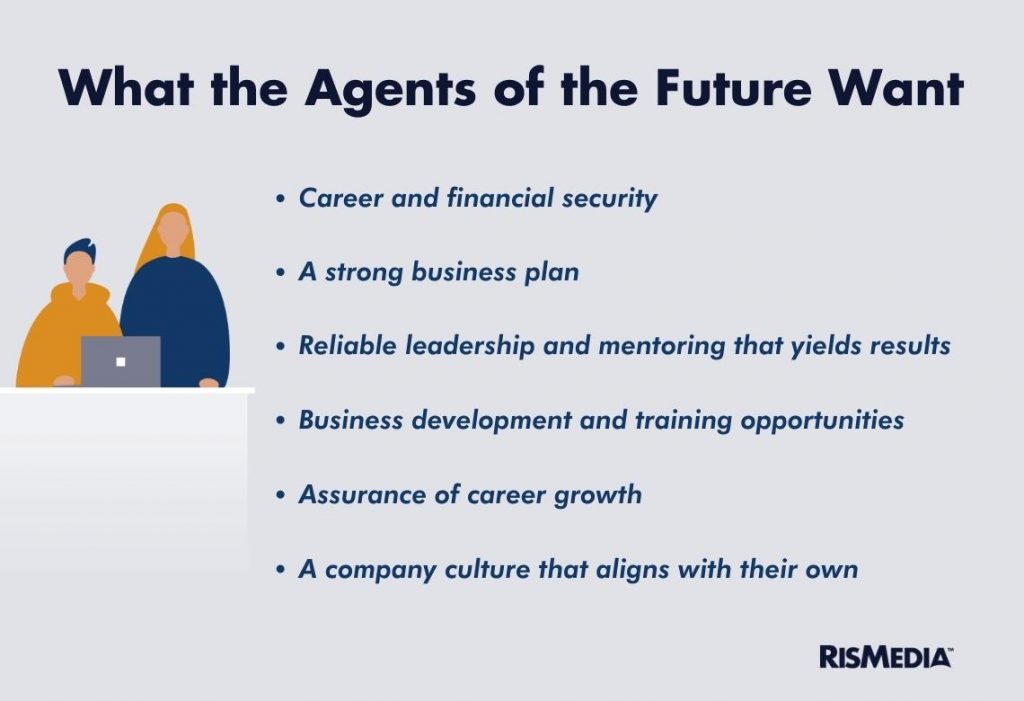
“It is a multigenerational workforce that we have these days, but it’s also a multigenerational buyer pool, and most clients want to work with contemporaries at some level, so I think it’s important for our salesforce to be multigenerational as well,” O’Connor said.
The competition in the industry is as fierce as ever. Traditional brokerage models that have been around for decades are rubbing shoulders with emerging models as they all try to bring new or experienced agents into the fold.
With a seemingly infinite amount of options for agents, how do you stand out from the rest?
According to Saunders, it starts with ensuring that your company story resonates with the agents of the future.
“You have to pitch to the audience in front of you, and we are seeing a younger audience actually coming into the business,” he said.
Saunders continued, “When you come from an established company, the next generation always has to be looking at how you translate it into the current market, and with this many groups of consumers/agents across generations, you have to have the ability to understand how to tell the story on their terms and where they are.”
Here are a few things to consider when telling your brand’s story to prospective recruits:
Build Up and Position Your “Ambassadors”
Take time to audit your ranks and identify agents who are thriving in the company, their markets, on social media and among their peers. Those are the folks you want out there promoting your brokerage to agents at other firms.
“Who are those people that are your culture, and can you lift them up in the industry to let them tell that word and sell the gospel about your company?” asked Finn. “You’ve got to help them get to where they need to be and lift them so they can do that job for you.”
Teamwork and a Unified Message
Consistency in messaging and branding is a must-have for every recruiting strategy. That also means that your recruiting team and brand ambassadors—current agents, office managers and recruiters—need to be on the same page when speaking about your company and what it can do for agents. What are your core values? What are you doing to stay relevant and competitive? How can your brand take an agent’s career to new heights? The talking points should match up, no matter who is saying them.
“If you’re not telling your story, and your troops don’t believe it, you’re never going to have a good recruiting strategy because they’re out there talking to people you’re going to recruit long before you’ve talked to them,” Saunders says.
Get in on the Ground Level
Suppose you’re looking to hire younger generations. Making sure your brand has a presence in local colleges and universities can be an excellent way to gauge interest among the future workforce and have your company stand out as a landing spot for young and eager agents.
“We’re looking at how you grow those people, and I’ll tell you that they’re looking to their parents and asking them what they think they should be doing,” said Gonzales. “All of us need to remember that those millennials and Gen Z want their parents’ support, and they also want to know that they can live independently and not in their parent’s basement.
“They want to be able to be in a profession where they can do it on their own, and that’s something that we all know you can do , but we’ve got to get out there and talk about it, so that’s what we’re doing in our community,” she added.
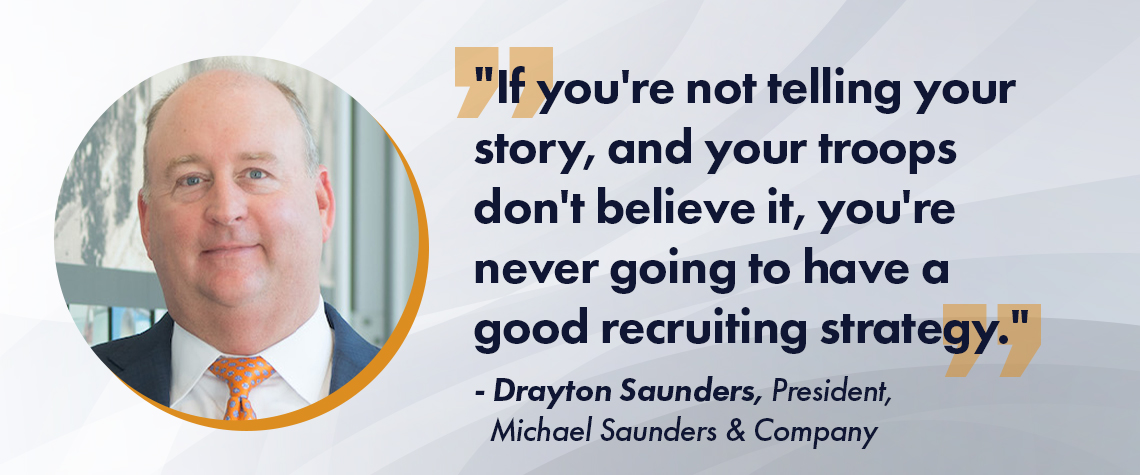
Are You a “Secure” Landing Spot?
In the past couple of years, there have been plenty of headlines related to agents transitioning to other brokerages for profit sharing, stock options and other financial incentives. On the surface, that may seem like it’s driven by money, but in reality, it goes a bit deeper than that.
Providing financial and career security and growth for agents is a significant selling point for any brokerage that can back it up with the programs and initiatives they offer.
“What security really is is a successful and rewarding career,” said Finn. “If you can’t provide that or start a program, how can you tell your story that’s basically ‘I’m going to get you to a rewarding career that’s going to be successful no matter the marketplace or the competition?'”
Those programs can include:
- Revenue sharing
- Investment guidance
- Leadership tracks
- Stock options
- Retirement plans
- Health plans
“It’s how you adapt, grow and tell the story. Make sure agents know that you are looking out for them as much as they are looking out for themselves,” said Hanna.
A Company Culture That Keeps Agents Happy and Loyal
While agent recruitment is a significant aspect that no leader can ignore, it’s only one side of the coin. Growth—particularly in the good times—is essential, but sometimes it’s not how many agents you’re bringing in…but how many are sticking around.
No matter the circumstances in the housing market, agents are looking for the best opportunities to succeed. An essential part of that is knowing that they’re receiving support from the broker or team leads and are part of a culture that’s conducive to their business needs.
Supporting your agents goes beyond the bells and whistles you provide as a broker/owner, according to Ryan Raveis, co-president of William Raveis Inc. He tells RISMedia that treating agents like family is how they’ve thrived for decades in recruiting and retaining their sales associates.
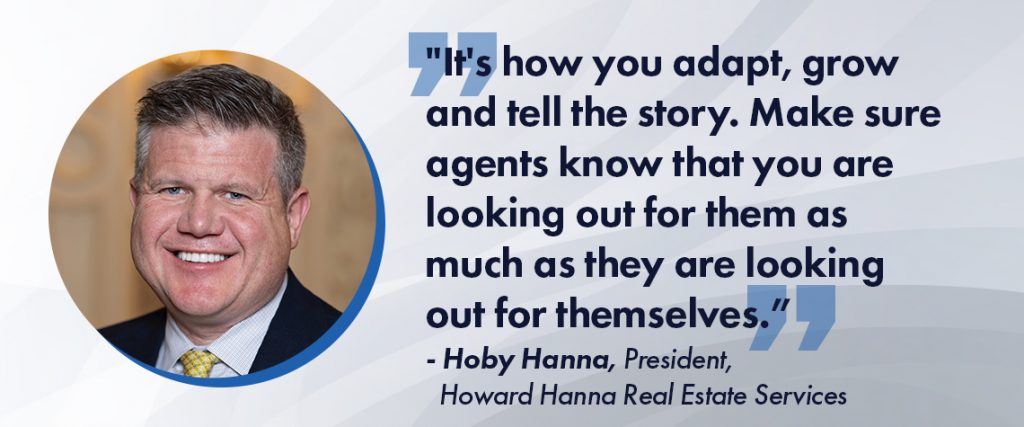
“It’s having emotional support when things aren’t going the right way because life goes through its ups and downs, and that’s how we as a brokerage generate the culture that we have,” Raveis says. “It’s not a magic sauce. It’s just caring.
“This is an emotional business,” Raveis says. “It’s beautiful and unlike any other business in the world. You have to approach your team like they are family, and if you treat it like a transactional business, it’s going to be just that, and that doesn’t last, and it’s not a marriage.”
Part of that marriage is being able to meet the needs of agents across all experience levels. Agent needs vary depending on the individual agent, but they consist of some or all of the following components:
- Strong leadership and guidance
- Reliable agent-facing resources and tools
- Relevant coaching and business development opportunities
“You may be willing to work 25 hours a day, but if you don’t have the right direction, then you’re just spinning your wheels,” Raveis says. “You need leadership to help you out, point you in the right direction, develop a plan and execute it, and know when to adjust it if the plan isn’t reaching the goals that you’re setting for yourself.”
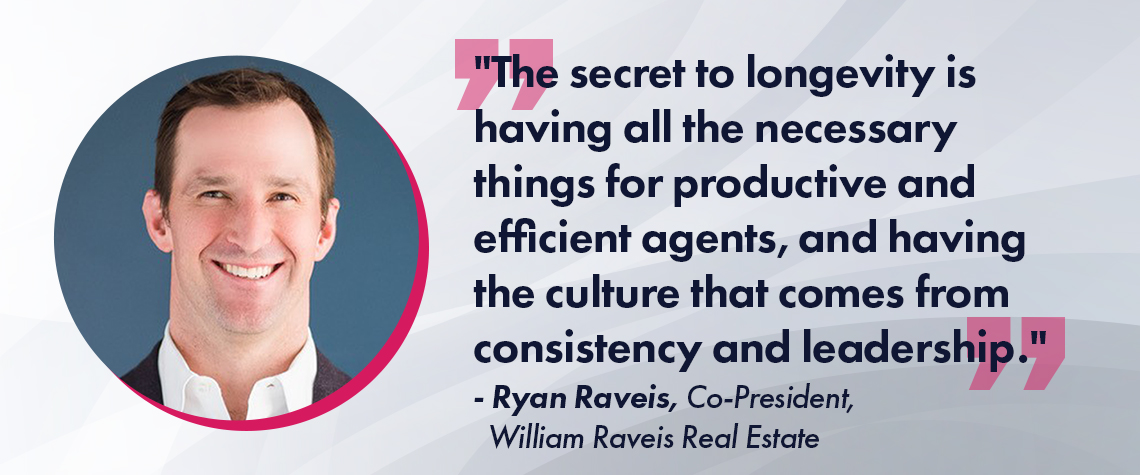
With how the housing market has been moving—or stabilizing—there are plenty of agents concerned about productivity, with forecasted sales-volume dips on the horizon.
This means that leaders must create a culture that promotes success among their agents.
As Sherri Johnson, CEO & founder of Sherri Johnson Coaching & Consulting, told RISMedia, “it is absolutely vital to create vibrant, productive and positive environments that your agents want to be a part of and contribute to so they can reach their goals.“
To that end, Johnson urges leaders to adopt the following methods:
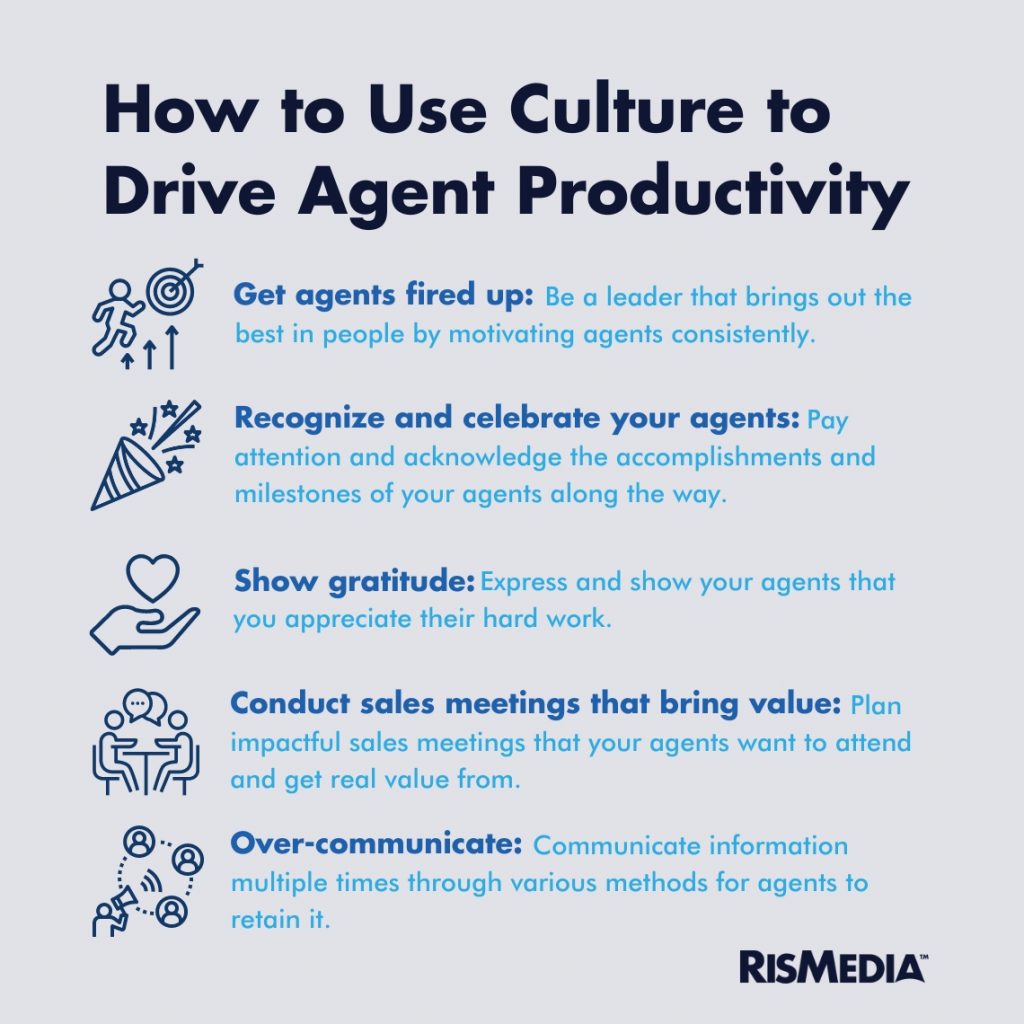
If there is something you want to resonate with your team, you should communicate through the following:
- In-person (one-on-one)
- Phone calls
- Zoom calls
- Emails
- Sales meetings
- Texts
With a company culture—known as “COOLture”—that has earned industrywide recognition, Realty ONE Group executives tell RISMedia that education is an essential resource they’re using to guide their agents through the shifting market.
“The past couple of years have been an anomaly in our industry, and many agents have drifted away from proven success strategies,” Realty ONE Group’s Chief Learning Officer Mark Pessin says. “As the average days on the market increase, interest rates continue to rise and home prices start to decrease, agents must change their tactics rapidly.”
To that end, Pessin notes that Realty ONE’s “RevUP” program is designed to teach agents “proven and time-tested methods” for business development, effective communication and client representation.
The mentoring program covers several skills that may appear conventional or familiar to agents: working your database, running effective open houses, finding sellers and more.
Still, it drives home the importance and utility of putting the basics back into practice.



